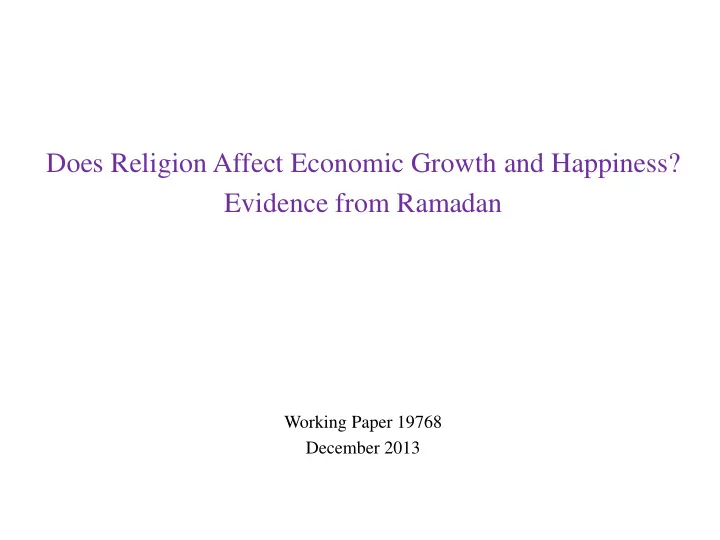

Does Religion Affect Economic Growth and Happiness? Evidence from Ramadan Working Paper 19768 December 2013
Filipe R. Campante Education Ph.D. Economics, 2007, Harvard University Interests Political Economy, Macroeconomics, Development Economics
David Yanagizawa-Drott Education PhD, Economics, 2010, IIES Stockholm University Interests Political Economy, Economic Development
Introduction Religions are essentially ubiquitous across human societies. It is thus natural to speculate that they may affect important economic outcomes, such as economic growth – as many have done dating at the very least to Max Weber’s (1905) celebrated work . one fundamental aspect that is common to all forms of religion is that they prescribe rules of behavior, or practices, that constrain followers. religious practices are a kind of informal institution (North 1991), imposing constraints that structure economic, political and social interactions .
Introduction First, religious practices impose an immediate trade-off, as they require time and resources that are then unavailable for production. Going to temples or to pilgrimages, taking time to pray or to meditate or to study sacred books, spending money on religious rituals, not working on religious days of rest: these will all take away from what is devoted to (materially) productive activities. Second, they may shape beliefs and values that determine economic decisions such as labor supply, occupational choice, or savings behavior.
Introduction we present in this paper what is, to the best of our knowledge, the first estimate of a causal effect of a religious practice on economic growth and subjective well-being. We do so by focusing on the specific example of fasting in observance of the Islamic holy month of Ramadan. Ramadan fasting is surely a very prominent example of religious practice: as one of the Five Pillars of Islam, its observance is understood to be obligatory for all billion-plus Muslim believers. we show that longer prescribed Ramadan fasting has a robust negative effect on output growth in Muslim countries, whether measured by GDP per capita or GDP, and whether measured in yearly rates or aggregated up to five-year periods.
Introduction Using data from the World Values Survey, we find that Ramadan fasting leads Muslim individuals to report greater levels of both happiness and life satisfaction. What is the effect of Ramadan fasting on GDP in long-Run is ambiguous. Because the salience of religiosity and family life during that month could certainly have an effect on individual beliefs and attitudes towards work beyond the month itself. Our evidence indicates that exogenously inducing Muslims to fast longer, for religious reasons, has a net positive impact on their SWB: put simply, it makes them happier in spite of making them relatively poorer.
Identification Strategy and Specification There are two key factors that interact to give rise to arguably idiosyncratic and exogenous variation in Ramadan fasting hours. First, the timing of the start of Ramadan is a factor: in years when Ramadan is held during summer months, the sun is up for longer, and fasting hours as stipulated by the Qur’an increase accordingly. Second, the geographical location of the country, and more specifically its latitude. As long as we control for year and country fixed effects, we automatically control for any possible independent effects of Ramadan timing and country latitude.
Identification Strategy and Specification Figure 2 then illustrates the way latitude and timing interact in affecting stipulated fasting, to provide visual intuition for the variation we use for identification. Note that the farther from the Equator, the greater the amplitude of variation.
Identification Strategy and Specification We implement this identification strategy by estimating the following equation: where g is an outcome (real GDP growth, real GDP per capita growth, etc.) in country c in year t, Ramadan Hours is the average daily number of fasting hours during Ramadan, capture country and year fixed effects, respectively. Our basic hypothesis that Ramadan has a negative effect on economic growth would thus translate into
Identification Strategy and Specification we complement that equation with an alternative (differences-in- differences) specification that makes use of the fact that Ramadan fasting hours should not affect economic growth in countries that have very small Muslim populations. Specifically, we estimate: where Muslim is a dummy equal to one if Muslims make up at least 75 percent of the population, and zero if there are less than 25 percent Muslims. This specification also allows us to include Muslim-country-by-year fixed effects, which control for any yearly shocks that might differentially affect Muslim countries. If Ramadan fasting truly affects economic outcomes, we would expect
Identification Strategy and Specification When it comes to individual survey data, on SWB, labor market status, and beliefs regarding work and religion, we implement our identification strategy with the following specification: where subscript i denotes individual i living in country c surveyed in year t, and is a vector of demographic controls (The controls are: gender dummy, second-order polynomial in age, marital status dummies, number of children, and education dummies)
Results
Results
Mechanism
Mechanism
امش هجوت زا ساپس اب
Recommend
More recommend